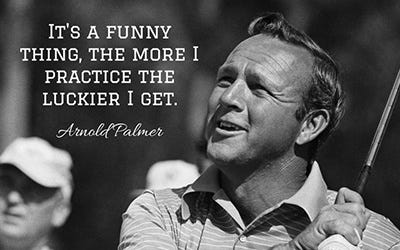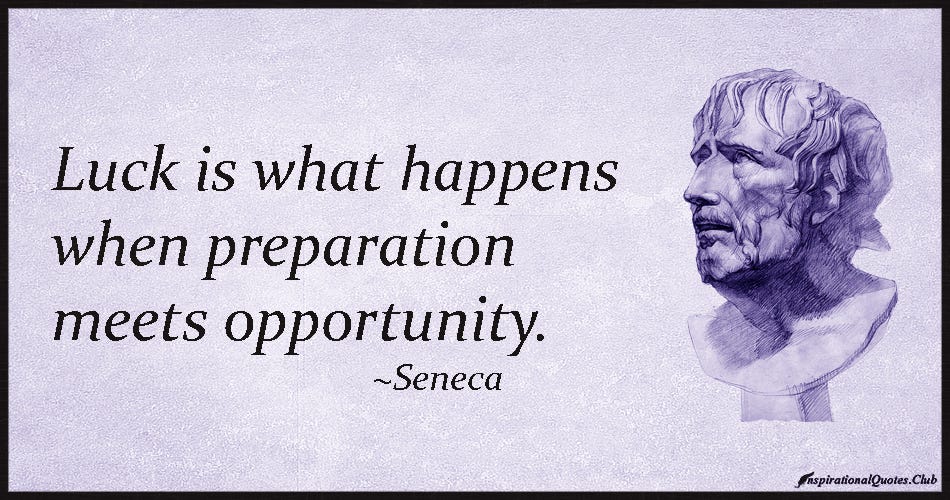Is it Lady Luck or Mad Skillz?
While we always want to credit one or the other, it's usually a bit of both.
- Golf Hall of Famer Arnold Palmer
- Baseball Hall of Famer Branch Rickey
- Philosophy Hall of Famer Seneca
- I have no idea if clueless is in any Hall of Fame. It’s a pretty good quote though.
Ahh, luck versus skill. It’s an age-old debate, and one I seriously doubt I will do anything to settle today. Thankfully, that is not my intent. I am only interested in the relationship between the two and how it might relate to investing.
It is in our nature to frequently dismiss legitimate achievement with “Meh, it was just luck.” And you know what? Sometimes it is. But other times it’s not, and in the moment we often have no way to tell the difference. When should we admit luck has smiled down upon us? Similarly, when should we acknowledge that skill has ruled the day? Most confounding of all, how the heck do we explain those who seem to get lucky so darned consistently?!?
These questions might be easier to consider if we think in terms of probability. For example, natural talent with a 99% chance of success strongly suggests skill will lead the way. Likewise, the 1% longshot hitting twice in a row means you should probably thank your lucky stars. That 50/50 coin flip? Well, now you’ve found the luck/skill sweet spot.
I believe probabilistic thinking is an area where successful investors shine. They can intuitively gauge the odds and turn it into decisive action. If you think about it, every investment represents some combination of upside potential and downside risk. The trick is accurately assessing that upside as often as possible. We want to avoid 50/50 or worse bets while piling into the 60/40’s, 70/30’s, and 80/20’s. Stack up enough of these, and you will almost certainly produce market-beating returns. And when you hit big on a string of them - like say ZM and TSLA and SE and ENPH and LVGO - you just might end up with the ridiculous 2020 gains some have posted thus far.
“So what?” you say. OK, that’s totally fair. I’ll admit this oh-so-hot take ain’t worth squat if there’s nothing actionable behind it. Well, I see at least two things I can keep in mind. First, I can avoid guessing at broad market moves. Not only are macro issues notoriously unpredictable, but they tend to involve so many variables the odds almost always trend toward 50/50. Why waste time trying to tease out tiny differences between mostly even bets?
Second, I can actively seek out thoughtful crowdsourcing. A good group regularly magnifies strengths and minimizes blind spots. Even better, a great one can raise the odds in a way no individual could ever match. It is force multiplication at its finest. When Joanie’s thoughts boost our chances a couple percent and Johnny’s comment adds a couple more, now we’re gettin’ somewhere. It is the power of human compounding, and it can be an enormous win-win for those who make it work.
This is not to say we’ll get every call right, but fortunately we don’t have to. We only need to be right more often than wrong while remembering to never risk it all on a single bet. So, don’t fret over the exact mix of luck versus skill when making an investment. Be excited instead you 100% get to pick the odds you will accept in the first place. The more you choose favorable probabilities, the more those around you will think you are one lucky bastard. And since there’s little you can do to change their minds, you might as well just go ahead and prove ‘em right.
Thanks for reading and good “luck” out there.








I like your writing! Came here after reading your work (and others'!) at Saul's, Tinkers and MF. I read a book quite awhile ago that you reminded me of with this post. It's called The Luck Factor by Richard Wiseman. Of course, some luck is random. But quite a bit also comes from being open to seeing opportunities and creating self-fulfilling prophecies. I recall in the book they were able to run an experiment where people who were self-reporting as unlucky simply didn't see money laying on the ground. People who described themselves as lucky saw the money laying on the ground and picked it up. They were more open to seeing the opportunities around them.
I think this applies to investing, as well, in various ways. Over the past several years I've become more open to listening to the opportunities I see from certain places. This would be the crowdsourcing you mentioned above. I can look at a much smaller universe of potential stocks and then do my own research from there. If I have to do all of the screening and analysis myself, by myself, it just wouldn't happen. And then I'd be stuck with index funds.
Thanks for your work here and in the various forums.
-JR
http://richardwiseman.com/resources/The_Luck_Factor.pdf
Not sure i would call it luck or its opposite but I find it hard to predict how the market will react to a companies performance at times. For example, i bought TTD last summer and now it became my first 4 bagger. I held as it went negative in revenue in Q2 and then watched as it came roaring back in Q3 to mid 30's growth and could hit 40% revenue growth next quarter. Is it the Jeff Green factor? Is it just the overall size of the market? My thesis worked out, I held because I believed the pandemic would accelerate programmatic advertising in the long run. I'm surprised TTD has done so well the past 6 months, yet I'm also surprised that Okta has been on par with the market the last 6 months, so it hasn't been that great. Both are great companies but sometimes the market doesn't value a company like we think they will or should. What do you think?